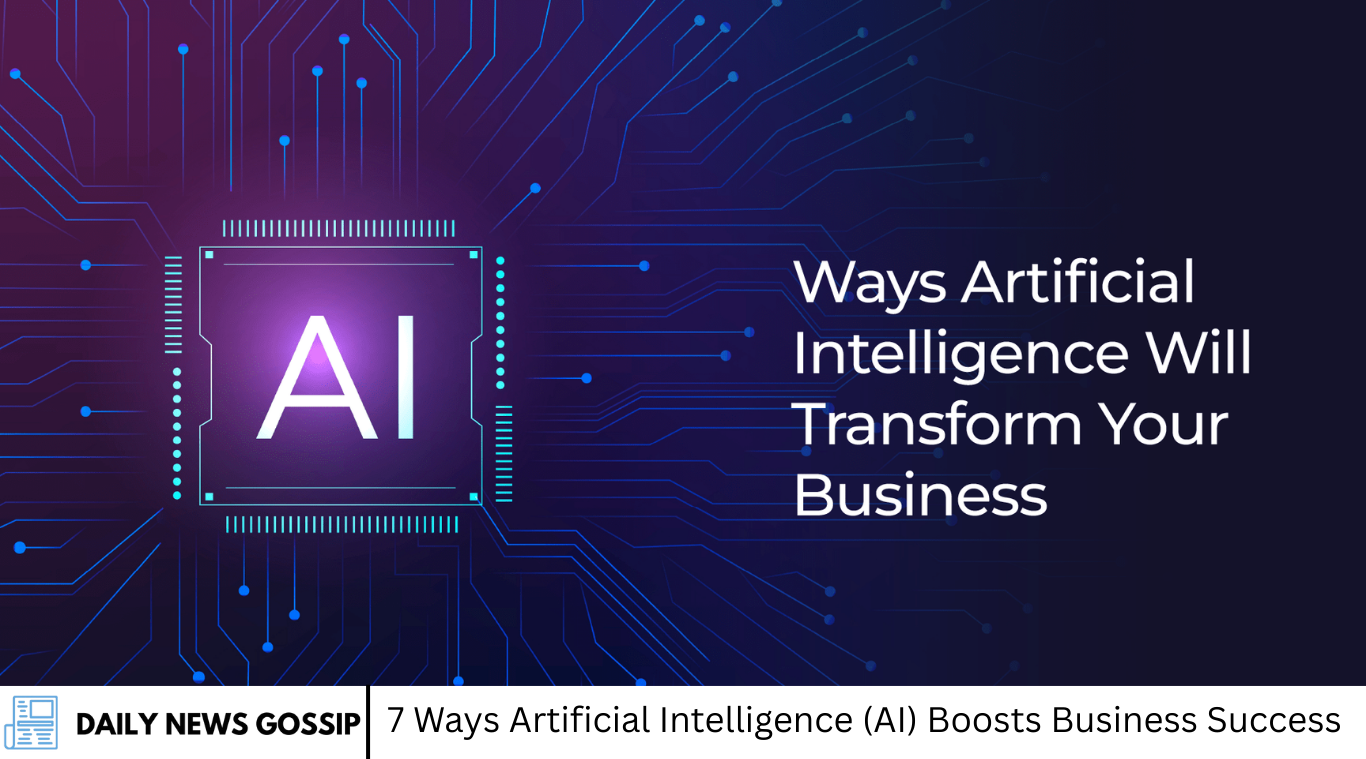Artificial Intelligence (AI) has emerged as a game-changing technology for businesses across the globe. From startups to multinational corporations, AI’s ability to analyze data, automate tasks, and enhance decision-making processes is revolutionizing how companies operate. In 2025, AI is no longer a futuristic concept; it’s a fundamental tool driving business success in virtually every industry.
This article explores 7 key ways AI boosts business success, highlighting practical benefits, real-world applications, and future potential. Whether you’re a business leader, entrepreneur, or tech enthusiast, understanding AI’s impact can help you harness its power for growth and innovation.
Enhancing Operational Efficiency
One of AI’s most immediate benefits is automating routine tasks and optimizing workflows. Businesses can reduce manual labor, minimize errors, and accelerate processes using AI-powered tools.
How AI Improves Efficiency:
- Robotic Process Automation (RPA) handles repetitive tasks like data entry, invoice processing, and customer service inquiries.
- AI algorithms optimize supply chain management by predicting demand, managing inventory, and improving logistics.
- Intelligent scheduling tools allocate resources efficiently, reducing downtime and bottlenecks.
Real-World Example:
Amazon uses AI-driven robotics in its warehouses to streamline order fulfillment, cutting delivery times and costs significantly.
Data-Driven Decision Making
Businesses generate enormous amounts of data daily. AI helps interpret this data, extracting actionable insights that improve strategic decision-making.
Benefits Include:
- Predictive analytics forecast market trends, customer behavior, and potential risks.
- AI-powered dashboards visualize key performance indicators (KPIs) in real-time.
- Natural Language Processing (NLP) analyzes customer feedback, social media, and reviews for sentiment and trends.
Real-World Example:
Financial institutions use AI models to detect fraudulent transactions and assess credit risk faster and more accurately than traditional methods.
Improving Customer Experience
AI enables businesses to deliver personalized, timely, and seamless customer interactions that foster loyalty and satisfaction.
AI in Customer Service:
- Chatbots and virtual assistants provide 24/7 support, answering queries instantly and resolving issues.
- Recommendation engines suggest products based on user preferences and behavior.
- Voice recognition and sentiment analysis tailor communication styles for better engagement.
Real-World Example:
Netflix’s AI-powered recommendation system drives a significant portion of user engagement by personalizing content suggestions.
Driving Innovation and New Product Development
AI fuels innovation by enabling businesses to create new products and services or enhance existing ones through data insights and automation.
How AI Supports Innovation:
- Generative AI models design prototypes, simulate scenarios, and optimize designs.
- AI analyzes market gaps and customer needs to guide product development strategies.
- Machine learning accelerates research and development by processing complex datasets.
Real-World Example:
Pharmaceutical companies use AI to speed up drug discovery, identifying potential compounds much faster than traditional methods.
Enhancing Marketing and Sales
AI transforms marketing and sales by automating campaigns, segmenting audiences, and optimizing conversions.
Marketing Advantages:
- AI-driven tools create personalized email campaigns and social media ads.
- Predictive analytics identify high-value leads and sales opportunities.
- Chatbots assist with lead qualification and customer onboarding.
Real-World Example:
Salesforce’s Einstein AI platform helps businesses forecast sales and automate marketing tasks, increasing revenue efficiency.
Strengthening Cybersecurity
With rising cyber threats, AI offers advanced defense mechanisms that protect business data and infrastructure.
AI in Cybersecurity:
- AI systems detect unusual patterns and potential threats in real-time.
- Automated responses mitigate risks faster than manual intervention.
- Continuous learning improves detection of new and evolving cyber-attacks.
Real-World Example:
Banks and tech companies use AI-powered security platforms to safeguard sensitive customer information from breaches.
Optimizing Human Resources and Talent Management
AI enhances human resource functions by streamlining recruitment, employee engagement, and performance management.
HR Benefits:
- AI-powered recruitment tools screen resumes, reducing bias and improving candidate matching.
- Sentiment analysis gauges employee satisfaction and identifies areas for improvement.
- Predictive analytics forecast workforce needs and training requirements.
Real-World Example:
Companies like IBM use AI to analyze employee data and predict turnover, helping to retain top talent.
Challenges and Considerations
While AI offers immense benefits, businesses must address challenges such as data privacy, ethical use, and the need for skilled talent to implement AI solutions effectively. Balancing automation with human insight remains crucial.
Frequently Asked Questions
What types of businesses can benefit from AI?
AI benefits businesses of all sizes and industries, from retail and healthcare to finance and manufacturing.
Is AI expensive to implement for small businesses?
Many affordable AI tools and cloud-based solutions make AI accessible to small and medium-sized enterprises (SMEs).
Does AI replace human jobs?
AI automates repetitive tasks but also creates new roles focused on oversight, strategy, and complex problem-solving.
How can I start integrating AI into my business?
Begin by identifying pain points and exploring AI tools that address those areas; pilot projects help test effectiveness before scaling.
What skills are required to work with AI in business?
Skills include data analysis, machine learning basics, programming, and understanding business processes.
How does AI improve customer experience?
By personalizing interactions, providing instant support, and anticipating customer needs through data analysis.
What are the risks of using AI in business?
Risks include data breaches, biased algorithms, and over-reliance on automation without human oversight.
Conclusion
Artificial Intelligence is a transformative force that boosts business success by enhancing efficiency, decision-making, customer experience, innovation, marketing, security, and talent management. Companies that embrace AI thoughtfully will gain a competitive edge and unlock new growth opportunities in 2025 and beyond.

